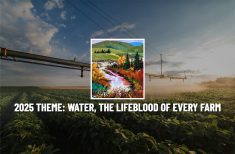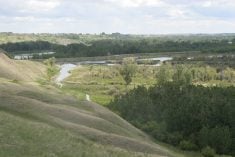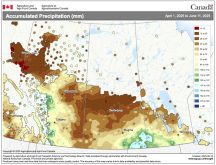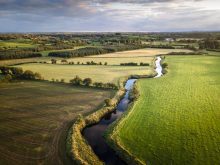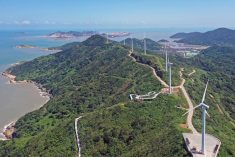A UN University Hub focusing on water will be located at the University of Calgary to help communities adapt to changes
Bridging the gap between scientists and decision makers to better deal with the impact of climate change on water is one goal of a pioneering global initiative involving the University of Calgary.
It has been named the home of the first United Nations University Hub in the world to focus on water, said Martyn Clark, the University of Calgary’s Schulich Chair in Environmental Prediction.
Related stories on this issue:
- Scientists sounds water crisis alarm
- Rivers face increased demand and dwindling water supply
- B.C. ranchers want focus on water management
- Preparing for climate change
- New cross may boost heat tolerance
Read Also

Huge Black Sea flax crop to provide stiff competition
Russia and Kazakhstan harvested huge flax crops and will be providing stiff competition in China and the EU.
“In the 1990s, a lot of the research that I was involved in was looking at predicting what might happen in the year 2020 or 2030,” he said.
“Now, what we’re seeing is that we’re moving from predicting what might happen to observing what has happened… I think we’re seeing those changes in climate that are having profound effects on our lives and our livelihoods.”
Scientists have declared 2023 to be on track to be the hottest year on record. Canadian wildfires reached unprecedented levels that not only destroyed homes and forced the evacuation of communities such as Yellowknife, but also released smoke that affected air quality as far south as Chicago and New York.
Farmers and ranchers across much of Western Canada faced drought, which affected watersheds relied on for things such as irrigation. Calgary implemented outdoor water restrictions after the flow of the Bow River reached its lowest level since 1911.
The pace of the transformation has surprised Clark.
“We need to build resilience to those changes and think more carefully about what we can do to build that resilience.”
The hub plans to help communities adapt to environmental change, said a statement by the University of Calgary. Four research clusters have been created at the university to tackle the problem.
Clark is leading a cluster headed by the Schulich School of Engineering that will focus on environmental predictions for water sustainability. The Faculty of Veterinary Medicine will lead a cluster that will target infectious diseases and climate change.
The Faculty of Science will spearhead a cluster that will seek to understand changes in aquatic ecosystems, said Clark.
“And the last one is building resilience in Indigenous communities that’s jointly led out of the Faculty of Science and the Faculty of Arts.”
The United Nations University, launched in 1975, targets a variety of global development challenges through 13 research and training institutes in 12 countries, including Canada.
The hub was formed through a partnership between the University of Calgary and the United Nations University Institute for Water, Environment and Health in Hamilton, Ont.
The research cluster on environmental predictions for water sustainability will look at promoting climate resiliency, said Clark.
“All the work that we’ve been doing to improve the resilience of our communities and our livelihoods to climate change, or climate variability, it really requires a disruptive transformation in the environmental intelligence that we have,” he said.
“Part of what we’re doing is to anticipate environmental change and environmental extremes. That’s the work that we’re doing on environmental predictions, so those could be predictions of soil moisture and over the coming season, predictions of stream flow, predictions of fire, etc.”
Society and its policymakers must improve decisions on disaster preparedness and climate adaption, said Clark.
A moratorium by the Alberta government on new solar and wind projects, which are partly aimed at reducing carbon emissions created by electricity generation, was partly sparked by rural concerns about protecting farmland needed to feed the world.
“When we’re looking at how we how we respond to change, there’s always going to be trade-offs,” said Clark.
“A lot of the meat of the matter is what are those trade-offs? Can we quantify those trade-offs? How do we make decisions given our understanding of those trade-offs?”
Clark has felt outrage about the deepening climate change crisis because researchers like himself knew changes were going to occur.
“They’ve been more pronounced than what we expected… we had the power to act, and we didn’t. That’s my personal perspective. That’s not my scientific view.”
However, he also felt optimistic about what can still be achieved.
“I’m seeing what a lot of countries are able to do. I can see the power of technology that’s enabling us to move forward… I think that we’ll be able to turn a corner if we think about things collectively and from an integrator perspective.”







